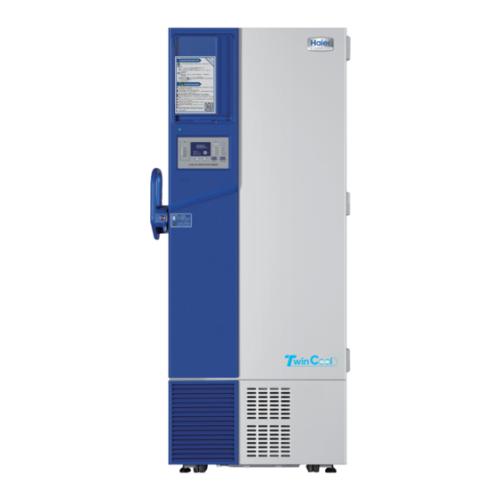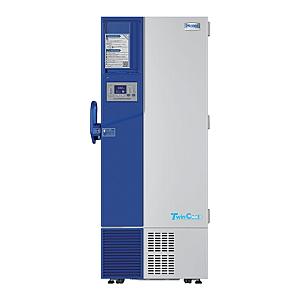The Haier DW-86L578S is an ultra-low temperature freezer designed for storing sensitive samples in laboratories and medical environments. With a capacity of 578 litres and a temperature range of -40°C to -86°C, it guarantees reliable and consistent cooling performance. Equipped with an intelligent control system and multiple safety alarms, this freezer is ideal for environments requiring optimal protection of biological samples. Its ergonomic design and high-quality components ensure efficient use and a long service life.
DW-86L578S Ultra-Low Temperature Freezer


Description
DW-86L578S ultra-low temperature freezer: performance and safety for biological storage
The DW-86L578S ultra-low temperature freezer from Haier is a state-of-the-art solution for the safe storage of biological samples and pharmaceutical products requiring extreme storage conditions. With a net capacity of 578 litres, it is designed to meet the needs of research laboratories, biobanks, hospitals and biotechnology industries where thermal stability is crucial. Its temperature range from -40°C to -86°C allows flexibility of use for different types of samples.
The DW-86L578S's refrigeration system is optimised to ensure fast and uniform cooling. Equipped with two hermetic Nidec compressors, it provides redundancy that maintains the internal temperature even in the event of a partial failure. Its copper tube evaporator and CFC-free foaming agent comply with environmental standards while improving energy efficiency. This model is also equipped with high-performance fans and a finned condenser, optimising heat dissipation and reducing energy consumption.
Safety is a priority with the DW-86L578S. It features a microprocessor control system for precise and secure temperature control. Users benefit from numerous alarms, such as high and low temperature, power failure, door open, sensor failure, low battery and excessive ambient temperature. These features are enhanced by a dedicated backup battery for alarm functions, ensuring continuous protection of samples.
Ergonomic and robust, the DW-86L578S has four sturdy interior doors that reduce cold loss when opened, as well as castors for easy movement. Its coated steel exterior panel and stainless steel interior walls ensure durability and ease of maintenance. Three adjustable stainless steel shelves allow for efficient organisation of the interior space and can support a maximum load of 80 kg each.
Thanks to its user-centric design, this ultra-low temperature freezer combines performance, safety and compliance with environmental standards. It is the ideal choice for facilities seeking to guarantee the integrity of their samples while optimising energy consumption.
Features
- Microprocessor control system with digital display
- Multiple alarms: high/low temperature, power failure, door open, sensor failure, low battery
- Backup battery to ensure alarm operation in the event of a power failure
- Rapid cooling: cools to -80°C in 280 minutes (at 25°C ambient temperature)
- Three adjustable stainless steel shelves (dimensions: 596 x 657 mm)
- Integrated castors for easy movement
- VIP insulation + environmentally friendly CFC-free foaming agent
- RS485 interface for connection to external monitoring systems
- Remote alarm port for increased security
- Finned condenser and EBM brand fans for optimal thermal efficiency
Technical Details
- Storage capacity: 578 L
- Temperature range: -40°C to -86°C
- External dimensions (W x D x H): 895 x 998 x 1980 mm
- Internal dimensions (W x D x H): 620 x 716 x 1310 mm
- Weight: 325 kg
- Energy consumption: 10 kW·h/day
- Power supply: 208–230V / 50Hz
- Compressors: 2 x hermetic (Nidec brand)
- Refrigerant type: R600a + R1150 + R14 (flammable mixture)
- Noise level: 53 dB(A)
- Door thickness: 90 mm
- Wall thickness: 90 mm
Compatible Accessories
- Three adjustable stainless steel shelves
- Integrated backup battery for alarms
- Remote alarm ports (RS485)
- Set of castors with brakes